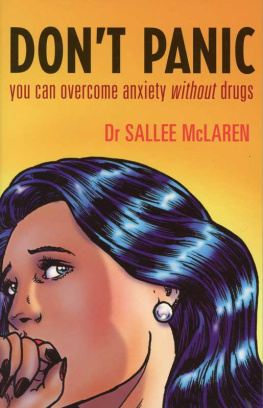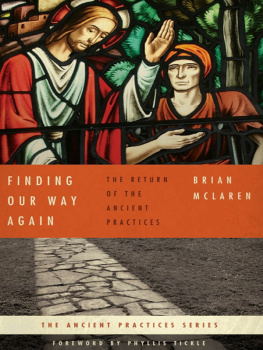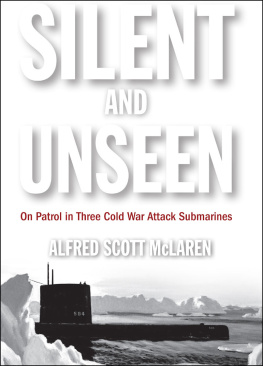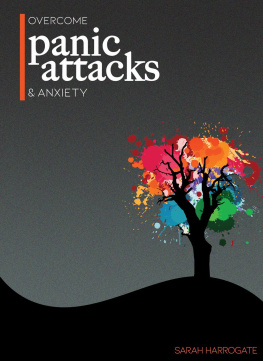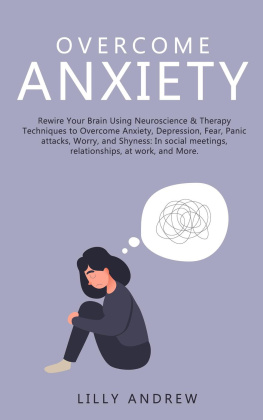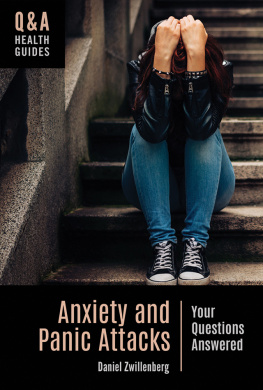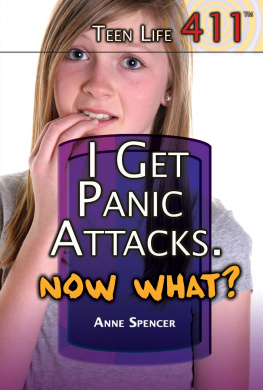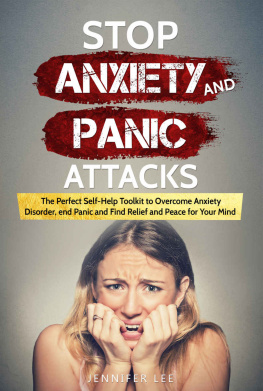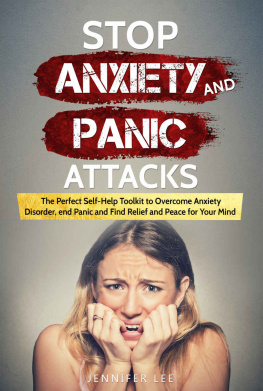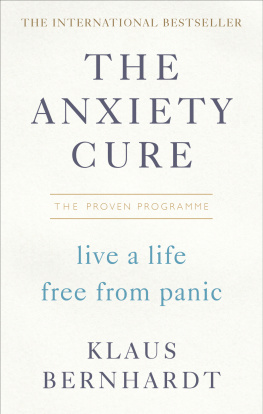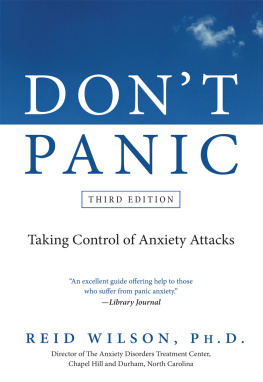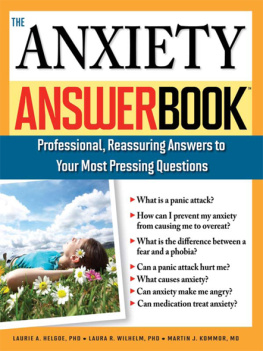
Scribe Publications
DONT PANIC
Dr Sallee McLaren is a doctor of clinical psychology who has worked in private practice for many years. In that time, she has helped thousands of people recover from anxiety and many forms of distress, and to regain control over their lives. Dr McLaren is also the consulting psychologist for the Anxiety Disorders Association of Victoria.
In Memory Of
Richard McLaren
(19291980)
Scribe Publications Pty Ltd
1820 Edward St, Brunswick, Victoria, Australia 3056
Email: info@scribepub.com.au
First published by Scribe Publications 2004
Copyright Sallee McLaren 2004
All rights reserved. Without limiting the rights under copyright reserved above, no part of this publication may be reproduced, stored in or introduced into a retrieval system, or transmitted, in any form or by any means (electronic, mechanical, photocopying, recording or otherwise) without the prior written permission of the publisher of this book.
Cover design by Miriam Rosenbloom
National Library of Australia
Cataloguing-in-Publication data
McLaren, Sallee.
Dont panic : you can overcome anxiety without drugs.
ISBN 9781921942723 (e-book.)
1. Anxiety - Popular works. 2. Depression - Popular works.
I. Title.
616.8522
www.scribepublications.com.au/
Contents
The world feels dangerous
Other people are hostile
I cant trust myself
I feel out of control
I need to stop the pain now !
I feel powerless
Deep down Im bad
Groups to contact for assistance
Acknowledgements
I am grateful to many people for their help in my writing of this book. In particular, I thank the many hundreds of patients who have been prepared to share the most private and often the most painful aspects of their lives with me. This book was written for all of you, and I hope it reflects the love and compassion I hold in my heart towards you. Your huge efforts in recovery have been completely inspiring.
I thank the Anxiety Disorders Association of Victoria (ADAVIC) for their support throughout the project. ADAVIC has been instrumental in providing help for people within the community who are anxious and distressed. The work is carried out by volunteers who are truly dedicated to their work. In particular, I want to thank Anna Kouloubos, Cathleen Geoghegan, Megan Sloley, Noel Brown, Catherine Madigan, Frank Duke, Michelle McMichael, Maria Villani, Danny Kelly, Merryn Snare, and Ruth Rosaliona wonderful group of people.
I thank the team at Scribe for helping me with preparation of the book. Special thanks to Henry Rosenbloom, who read the draft, ran with it, and made extensive editorial changes to improve the manuscript. Thanks also to Beryl Hill for her editorial recommendations.
I thank Dr Graham Bradley, who first introduced me to psychology at undergraduate level and made me feel passionately about it. I am forever grateful to associate professor Simon Crowe and professor Kim Ng for their supervision of my various theses at university and for their capacity to think outside the square.
Many other people helped along the way. Neile McLaren taught me how to construct arguments logically and rationally. Corinna Hente provided kindness and numerous detailed comments on the manuscript for which I am extremely grateful. David Paterson has been a fantastic support and a huge inspiration to me. Gill Finch has always been a brave and true friend. Gray McLaren, Gloria Gardiner, Jane Finch, Jan Browne, Helen, Jack, Glenda and Greg Stroud, Joanne OSullivan, Tim Humphrey, Madeleine Flynn, Michelle Weston, Robin Mullens, Lawrie Horner, Nancy Betten, Clem Elston, Kevin Gilding, and Liz Newnham are all close friends and family who have given me encouragement, support, and warmth.
Finally, this book would not have been written without three people. My passionate, smart and charismatic father, Richard McLaren, died suddenly, leaving me inconsolable but with a burning desire to do right by him. My son Kim taught me how to open myself to love. My husband Michael Gilding gave me shelter, and cradled and coaxed me out of my own difficult past into a truly optimistic future.
Introduction
JULIANS ANXIETY AND DEPRESSION had started about one year before he came to me. His symptoms seemed to have come out of the blue. At the time, Julian was taken to a psychiatrist, who placed him on anti-depressant medication. Julians mother was told by the prescribing psychiatrist that Julian had a biochemical imbalance in his brain, that he might never recover, and that he would need to take medication for years, if not for the rest of his life, to counter the imbalance. This was devastating news for a 13-year-old, but he began his medication in the hope that it would improve his symptoms.
Initially, Julians mother thought he had improved. However, about one month later, Julian started cutting and burning his legs. On several occasions he forced himself to keep cutting deeper and deeper. He usually used a pocket-knife, but once he sawed his arm flesh into the bone with a wood saw. He reasoned that if he suffered personal pain it might somehow prevent an intruder from attacking him. The more punishment he endured, the more he thought he was preventing harm. He also hoped that, if he could tolerate large amounts of pain, his torture by an attacker would not be such a shock.
In the months after seeing the psychiatrist, Julians condition worsened. His thinking became highly agitated, and he spent hours every day worrying about an intruder, convinced he was about to be murdered. About seven months after his first visit to the psychiatrist, Julian was placed in a psychiatric unit and his medication was increased. Upon his release from the psychiatric unit, Julian made several serious attempts upon his life. He tried to poison himself, took an overdose of drugs, and tried to hang himself. At times, his thoughts were so distressing he would slam his head into a wall to try to stop them. The psychiatrist thought that Julian was deteriorating into a pre-psychotic state, and increased his medication yet again. His mother was feeling desperate, afraid that her child would die. As it happened, the mother attended a seminar where I was speaking, and asked me to see Julian.
That was three years ago, and Julian was then 14 years old. Almost cowering, like a person broken from too much despair and hopelessness, Julian entered my consulting room with his mother by his side. Despite his level of despair, it soon became apparent that Julian was terrified to be there. Within minutes he was shaking and clammy, jumping at the slightest sound. He told me that he was having daily panic attacks, was not sleeping, and had recently lost about 10 kilogrammes in weight due to appetite loss from nausea. His thoughts were racing, and he was petrified of his repetitive thought that an intruder or murderer was going to attack and harm him.
In an attempt to stop the dreaded event, Julian had begun to behave in strange ways. he would check and recheck the house locks, staring for lengthy periods of time at doors and windows (in case they were not secure), refusing to go anywhere alone, looking around repetitively, having angry and irrational outbursts, and tapping, repeating words, or blinking a certain number of times in the superstitious hope of warding off any dangers. These repetitive checking behaviours had increased over time so that Julian was spending many hours every day on them. Julian looked quite odd when, during our first conversation, he would suddenly begin tapping his fingers and repeatedly glancing at the window.
By this time, Julian was often not attending school, and his academic performance was poor. I asked him how he had done at school before the anxiety started. He told me that he had nearly always achieved high marks. I then asked him what had gone wrong during the year before his anxiety started. It turned out that Julian had been bullied severely at the start of secondary school. A gang of tough boys were always laughing at him and insulting him, and threatening to beat him up. This was all made worse by the fact that Julian was physically small for his age. It turned out that Julian had been taunted and beaten up not long before his anxiety started. He had been punched to the ground, his nose bleeding, and then repeatedly kicked in the back, stomach, and head. He had been convinced these boys would kill him, even if by mistake.
Next page
